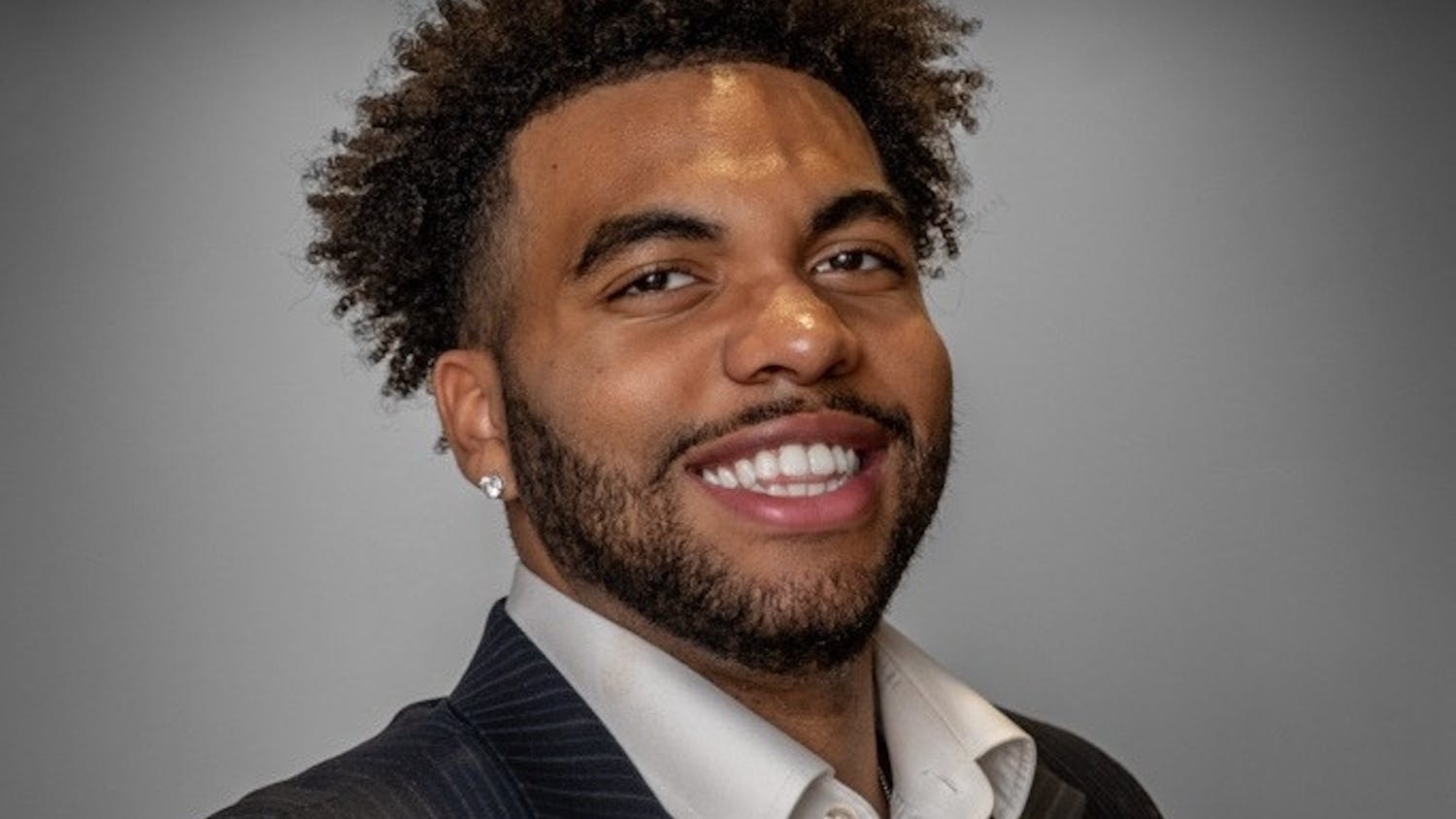[caption id="attachment_12284" align="alignnone" width="300"] © Mary Marshall[/caption]
“I’m taking action to ban the box—” A crowd of New Jersey policymakers, community members and educators erupted in applause, tearing through the persistent, respectful silence that began as soon as President Barack Obama took to the podium in Newark and started to speak. Obama continued his statement, “—for the most competitive jobs at federal agencies.”
This was one of two executive orders announced at Rutgers-Newark Center for Law and Justice on Monday, November 2, where the President spoke on an issue that has recently gained bipartisan traction: prison reform.
The location, less than five miles away from Seton Hall, was no coincidence as New Jersey has played a role in spearheading what Obama hopes will be a national reform movement.
His statement coincided with the release of over 4,300 inmates at the beginning of this month, a controversial action that was approved last year by the U.S. Sentencing Commission.
Currently, there are over 2 million people incarcerated in the country. In his speech, Obama pointed out that more than 600,000 inmates are released each year and almost 1 in 5 Americans have a criminal record, one third are of working age.
The President’s remarks followed a roundtable discussion with U.S. Sen. Cory Booker (D-N.J.) and members of Newark incarceration re-entry programs, programs which the President hopes will be a model for the rest of the country. “Here in Newark, when it comes to rehabilitating prisoners and reintegrating former inmates into society, you’ve got organizations that are doing extraordinary work,” Obama said.
Sen. Booker was personally acknowledged in Obama’s speech for his effort to push legislation in Congress. The President referenced the “ban the box bill” also known as the Fair Chance Act that was introduced by Sen. Booker and Rep. Elijah Cummings (D-Md.). While Obama
announced executive action toward this movement in addition to grant money to ease the re-entry process, he stressed that these will only carry limited weight in comparison to congressional action.
State-level New Jersey lawmakers emphasized their support for the bipartisan legislation as well. In an interview with The Setonian, Sen. Raymond Lesniak (D) explained, “It’s very difficult for Congress to get anything done, but if they can get anything done, this is something that I think they can.”
Dr. John Paitakes, senior faculty associate of the Department of Criminal Justice at Seton Hall, and a retired probation officer, shared his thoughts on the legislation.
“I believe there is some merit to the President’s political justice reform package,” he said. “However we have to make sure there are sufficient safeguards to keep the public safe. Careful risk assessment of anyone being considered for release must be a priority.”
Other Seton Hall community members revealed their personal ties to the prison reform push. Nicole Archibald, a junior accounting major, is a program coordinator for DOVE. She has lead the Petey Greene Program, which offers tutoring for students in correctional facilities, since last year.
Archibald said the program provides preparation for the TASC high school equivalency exam. Students range in age from their 20s to their 70s.
Archibald has had striking personal experiences at Northern State Prison that have fueled her policy beliefs. “One particular inmate was deeply saddened when the program finished,” Archibald recalled. “Growing up, he focused on boxing. While he enjoyed the sport and popularity that came with being an athlete, he was frustrated that education was not pushed from an early age. I remember him tearing up when I finished my last session,” she said.
“I’m deeply passionate about my personal views on prison reforms because of my experiences meeting the inmates, my personal struggles in life, and my Catholic faith,” Archibald continued. “I truly believe that each person has incredible potential to achieve greatness. By restricting people from such opportunities, society as a whole misses out.”
Students in the Criminal Justice program at Seton Hall are also taking note of the recent reform movement. Jeanette Alvarez, a senior Criminal Justice major, said her classes cover the topic on a weekly basis. “To me prison reform is changing the entire outlook we have as a nation on prison, and making strides to change prison from being viewed as not just as a punishment, but a rehabilitation and an attempt to turn that person’s life around,” she said. “Obviously this is not the case for every criminal, but for many I think it can be.”
Another senior Criminal Justice major, Mark Hagel, expressed similar beliefs. “‘Ban the box’ is an initiative I strongly agree with,” he said. “The lasting impact this reform can have will keep the country safer. In prisons themselves, rehabilitation is key in helping inmates adjust to the life during and even after prison,” he said.
Demetrius Terry, a member of the executive board of College Democrats of N.J. and legislative aide to Assemblyman Carmelo Garcia, also expressed support for prison reform from a political standpoint. “Newark Mayor Ras Baraka, U.S Senator Cory Booker and Congressman Donald Payne Jr. (are) standing up to make a difference in a system which has been negatively affecting African Americans and Hispanics for decades,” the junior sociology major said.
“Everyone in life deserves a second chance and should not be condemned by society. With more funding for economic development, jobs, education, and affordable housing, it will continue to help my community thrive.”
Mary Marshall can be reached at mary.marshall@student.shu.edu.
© Mary Marshall[/caption]
“I’m taking action to ban the box—” A crowd of New Jersey policymakers, community members and educators erupted in applause, tearing through the persistent, respectful silence that began as soon as President Barack Obama took to the podium in Newark and started to speak. Obama continued his statement, “—for the most competitive jobs at federal agencies.”
This was one of two executive orders announced at Rutgers-Newark Center for Law and Justice on Monday, November 2, where the President spoke on an issue that has recently gained bipartisan traction: prison reform.
The location, less than five miles away from Seton Hall, was no coincidence as New Jersey has played a role in spearheading what Obama hopes will be a national reform movement.
His statement coincided with the release of over 4,300 inmates at the beginning of this month, a controversial action that was approved last year by the U.S. Sentencing Commission.
Currently, there are over 2 million people incarcerated in the country. In his speech, Obama pointed out that more than 600,000 inmates are released each year and almost 1 in 5 Americans have a criminal record, one third are of working age.
The President’s remarks followed a roundtable discussion with U.S. Sen. Cory Booker (D-N.J.) and members of Newark incarceration re-entry programs, programs which the President hopes will be a model for the rest of the country. “Here in Newark, when it comes to rehabilitating prisoners and reintegrating former inmates into society, you’ve got organizations that are doing extraordinary work,” Obama said.
Sen. Booker was personally acknowledged in Obama’s speech for his effort to push legislation in Congress. The President referenced the “ban the box bill” also known as the Fair Chance Act that was introduced by Sen. Booker and Rep. Elijah Cummings (D-Md.). While Obama
announced executive action toward this movement in addition to grant money to ease the re-entry process, he stressed that these will only carry limited weight in comparison to congressional action.
State-level New Jersey lawmakers emphasized their support for the bipartisan legislation as well. In an interview with The Setonian, Sen. Raymond Lesniak (D) explained, “It’s very difficult for Congress to get anything done, but if they can get anything done, this is something that I think they can.”
Dr. John Paitakes, senior faculty associate of the Department of Criminal Justice at Seton Hall, and a retired probation officer, shared his thoughts on the legislation.
“I believe there is some merit to the President’s political justice reform package,” he said. “However we have to make sure there are sufficient safeguards to keep the public safe. Careful risk assessment of anyone being considered for release must be a priority.”
Other Seton Hall community members revealed their personal ties to the prison reform push. Nicole Archibald, a junior accounting major, is a program coordinator for DOVE. She has lead the Petey Greene Program, which offers tutoring for students in correctional facilities, since last year.
Archibald said the program provides preparation for the TASC high school equivalency exam. Students range in age from their 20s to their 70s.
Archibald has had striking personal experiences at Northern State Prison that have fueled her policy beliefs. “One particular inmate was deeply saddened when the program finished,” Archibald recalled. “Growing up, he focused on boxing. While he enjoyed the sport and popularity that came with being an athlete, he was frustrated that education was not pushed from an early age. I remember him tearing up when I finished my last session,” she said.
“I’m deeply passionate about my personal views on prison reforms because of my experiences meeting the inmates, my personal struggles in life, and my Catholic faith,” Archibald continued. “I truly believe that each person has incredible potential to achieve greatness. By restricting people from such opportunities, society as a whole misses out.”
Students in the Criminal Justice program at Seton Hall are also taking note of the recent reform movement. Jeanette Alvarez, a senior Criminal Justice major, said her classes cover the topic on a weekly basis. “To me prison reform is changing the entire outlook we have as a nation on prison, and making strides to change prison from being viewed as not just as a punishment, but a rehabilitation and an attempt to turn that person’s life around,” she said. “Obviously this is not the case for every criminal, but for many I think it can be.”
Another senior Criminal Justice major, Mark Hagel, expressed similar beliefs. “‘Ban the box’ is an initiative I strongly agree with,” he said. “The lasting impact this reform can have will keep the country safer. In prisons themselves, rehabilitation is key in helping inmates adjust to the life during and even after prison,” he said.
Demetrius Terry, a member of the executive board of College Democrats of N.J. and legislative aide to Assemblyman Carmelo Garcia, also expressed support for prison reform from a political standpoint. “Newark Mayor Ras Baraka, U.S Senator Cory Booker and Congressman Donald Payne Jr. (are) standing up to make a difference in a system which has been negatively affecting African Americans and Hispanics for decades,” the junior sociology major said.
“Everyone in life deserves a second chance and should not be condemned by society. With more funding for economic development, jobs, education, and affordable housing, it will continue to help my community thrive.”
Mary Marshall can be reached at mary.marshall@student.shu.edu.





